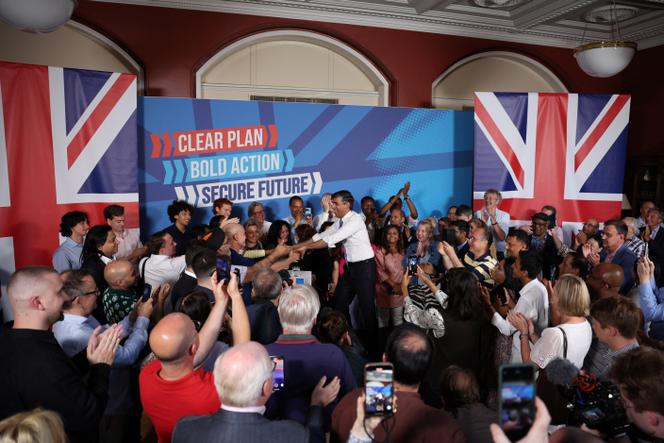

Tory activists crowded into the pretty parish hall of Chelsea Old Church in the heart of London's affluent Chelsea neighborhood on Monday, June 24. Well-dressed ladies and gentlemen in suits, local councillors and ministerial advisers, were all waiting patiently for Rishi Sunak. The United Kingdom's prime minister will have to try and cheer them up. With 10 days to go before the general election on July 4, the Conservative Party, which has been in power for 14 years, is still 20 points behind Labour in the polls.

"We're all on our way out," an adviser to one of Sunak's leading ministers told a colleague, wondering aloud "what a Labour government will look like." The mood is not just leaden, it's almost resigned in the ranks of the British right. Punctual and surprisingly cheerful, Sunak may have assured the audience that the Conservatives have "10 days to save the country from a Labour government" and urged them three times not to "surrender to a Labour government" and "fight for our vision of Britain," but his mere presence in West London this weeknight, after a trying day (he was in Scotland in the morning and had just come out of an interview with readers of the tabloid the Sun), proves just how desperate the situation seems.
The leader came to support his Minister of State for Trade Policy Greg Hands, MP for the Chelsea and Fulham constituency, hitherto considered blue (for Tory), impregnable by Labour's "reds." But according to the latest polls, no constituency is safe from the Labour wave that could sweep the UK on July 4, even those in the south of England traditionally favored by the right. The most prominent ministers are in the hot seat: Penny Mordaunt, leader of the House of Commons, is under threat in Portsmouth North, James Cleverly, the home secretary, in Braintree in Essex, as is Chancellor of the Exchequer Jeremy Hunt, elected in Surrey, Defense Secretary Grant Shapps, in Hertfordshire, and even Sunak in his stronghold of Richmond in North Yorkshire.
A series of polls has swept away the last hopes of an honorable defeat for the Conservatives, drawing an even more bitter failure than that of 1997, when New Labour and Tony Blair came to power, taking 418 of the 650 seats in the House of Commons. According to a Survation poll of 22,000 people in mid-June, the Tories are likely to retain just 72 seats (compared with 365 won in 2019), while Labour would pick up 456, the Liberal Democrats 56, the right-wing populist Reform UK seven, and the Greens two. Should this result be confirmed, it would far surpass the worst Tory defeat of 1906 when the Conservatives saved just 156 seats from the Liberal Democrats, the main opposition party at the time.
You have 61.13% of this article left to read. The rest is for subscribers only.
